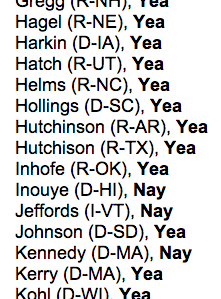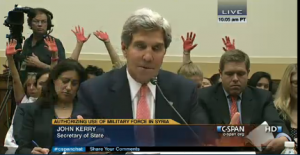France to Take Kerry’s Accidental Diplomacy to UN
With the Emptywheel fundraising week about half over, many thanks to those who have already donated. There is still time to become a donor.
The Russian gambit to take accidental diplomat John Kerry up on his offer of an “impossible” scenario under which Syria could avoid US military action continues to gather steam. This morning, both the Washington Post and New York Times fill us in on French plans to take the Russian proposal to the UN, where there seems to be a chance that there will not be a veto at the Security Council.
The Times gives us some information on the sequence of events leading to the proposal:
Mr. Lavrov said he had discussed the proposal with the Americans before announcing it at a hastily arranged briefing on Monday evening. Mr. Obama and Mr. Putin discussed the idea privately on the sidelines of last week’s summit of the Group of 20 nations, and Mr. Lavrov discussed it with Secretary of State John Kerry.
They spoke as Mr. Kerry flew home to Washington after first raising the idea in a dismissive way in London on Monday, making clear that the idea of Mr. Assad giving up Syria’s weapons seemed improbable.
In their conversation, Mr. Kerry told his Russian counterpart, “We’re not going to play games,” according to a senior State Department official.
That’s a good idea from Kerry not to play games, since he had been so badly outplayed to that point. So the official position appears to be that Obama and Putin had discussed the idea but Kerry stumbled onto the same concept, but only as an impossibility? Okay, then.
The Post has similar language on the sequence of most of the events between Kerry and Lavrov, but is a bit more nuanced as to the Obama and Putin discussion:
Obama said in an interview on “PBS NewsHour” on Monday that he had discussed the possibility of international monitoring with Russian President Vladimir Putin at last week’s Group of 20 summit in St. Petersburg.
The senior State Department official said Lavrov had previously discussed the idea in conversations with Kerry, including a telephone call as recently as Thursday, but never in the context of the proposed U.S. military action.
Clearly, the plan being discussed now, where Syria turns its chemical weapons over to international groups for eventual destruction goes well beyond “monitoring”. Is Obama claiming that discussions on monitoring are the equivalent of discussing this plan? Or is it just a desperate attempt to save face? I’m okay with face-saving if the lives of Syrian civilians are also spared.
Putting those considerations aside, though, I have one major concern about the French plan as described. Here is the Times description: Read more →


